Does anyone else here do any Metal Detecting/Treasure Hunting, I tend to hit the beaches after the tourist season has finished, you pick up rings, cell phones, ray bans, coins etc, and tons of tent pegs and bottle tops.
Navigation
Install the app
How to install the app on iOS
Follow along with the video below to see how to install our site as a web app on your home screen.

Note: this_feature_currently_requires_accessing_site_using_safari
More options
You are using an out of date browser. It may not display this or other websites correctly.
You should upgrade or use an alternative browser.
You should upgrade or use an alternative browser.
Metal Detecting
- Thread starter Slow Blow
- Start date
Sounds like a very interesting hobby, @Slow Blow. Can I place an order for a cell phone .
.
Always fascinated me but never got into it. I like keys...
Lee
Lee
That would be a sin of note..Maybe you will find some Vape Gear!
Losing vape gear
I once lost my Zippo over the side of the boat, so now I keep the Vape in a special waterproof floating pouch, tied around my neck.
I usually the most interesting lost items on the beaches with the most alcoholic bottle tops
I usually the most interesting lost items on the beaches with the most alcoholic bottle tops
I once lost my Zippo over the side of the boat, so now I keep the Vape in a special waterproof floating pouch, tied around my neck.
I usually the most interesting lost items on the beaches with the most alcoholic bottle tops
Lol so you Vape and carry a Zippo, is that slang for extra battery
Nah, that was when I still smoked analogLol so you Vape and carry a Zippo, is that slang for extra battery
As a historical treasure hunter for about 3 decades metal detecting was an often used tool from around the mid 70's to mid 90's. I used them to locate what was generally called "ghost towns"... but included small towns, outposts, work camps (CCC), logging camps, early 1800's rendezvous sites, forts and other places where people had lived/worked for a period of time that were known to have historically existed, but their exact location was unknown and no obvious traces of them was left. After endless research in libraries, from very old maps and other sources to at least have some idea of where they might be the hunt began. Many were never found and as far as I know have still never been found. But I did find quite a few of them over the years. Most of those that I did find were small mountain or desert settlements, camps associated with nearby long abandoned mining or logging operations, CCC camps, places where battles had been fought, one fur trade rendezvous site, Indian encampments, an Indian burial site and a fort.
Treasures found mostly included tools and implements, firearms, knives, swords, hawks, husbandry items, remnants of cabin/home construction items, and a lot of personal items (clothing embellishments, jewelry, precious gems, gold, silver and period coins (including foreign), trade tokens, medallions, household commercial items like cooking utensils, bottles, flat ware, enamel ware, plate, tin ware and pottery, advertising items, toys, and just about anything else from the time period when they existed.
Much of it was donated to historical museums in the states they were collected in. A few times i was able to trace down the descendants of individuals I found valuable personal items of and left those family heirlooms with them. But I still have my exonumia collection from those years. The "good for" items and medallions from the mid 1800's to about 1940's that at the time was the second largest collection of them, and includes many that are one of a kind. Most valuable of those are the ones made from precious metals, the saloon tokens and all of the one of a kind tokens/medallions. The fly in the soup with one of a kind exonumia though is that at any time someone might discover more of them, or even find an old buried jar or vessel in a pile of timbers that was at one time a log cabin that is full of them. One of my favorites of all of them is a saloon token from one that was owned by one of my ancestors. Only 2 are known.
Some examples of "GF" trade tokens.
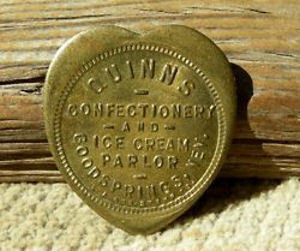
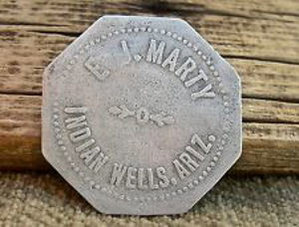
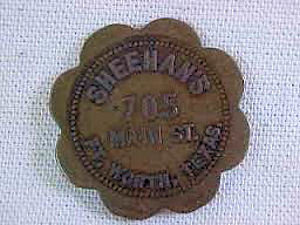
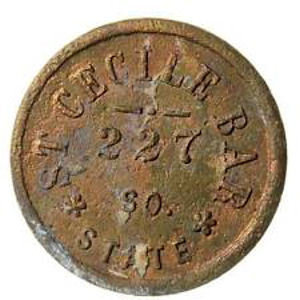
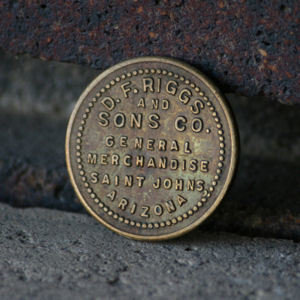
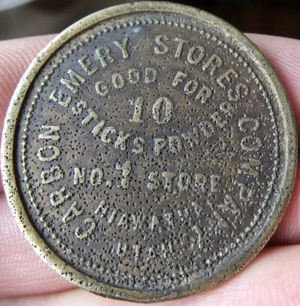
Treasures found mostly included tools and implements, firearms, knives, swords, hawks, husbandry items, remnants of cabin/home construction items, and a lot of personal items (clothing embellishments, jewelry, precious gems, gold, silver and period coins (including foreign), trade tokens, medallions, household commercial items like cooking utensils, bottles, flat ware, enamel ware, plate, tin ware and pottery, advertising items, toys, and just about anything else from the time period when they existed.
Much of it was donated to historical museums in the states they were collected in. A few times i was able to trace down the descendants of individuals I found valuable personal items of and left those family heirlooms with them. But I still have my exonumia collection from those years. The "good for" items and medallions from the mid 1800's to about 1940's that at the time was the second largest collection of them, and includes many that are one of a kind. Most valuable of those are the ones made from precious metals, the saloon tokens and all of the one of a kind tokens/medallions. The fly in the soup with one of a kind exonumia though is that at any time someone might discover more of them, or even find an old buried jar or vessel in a pile of timbers that was at one time a log cabin that is full of them. One of my favorites of all of them is a saloon token from one that was owned by one of my ancestors. Only 2 are known.
Some examples of "GF" trade tokens.






As ... , CCC camps, places where battles had been fought, one fur trade rendezvous site, Indian encampments, an Indian burial site and a fort.
Treasures found mostly included tools and implements, firearms, knives, swords, hawks, husbandry items, remnants of cabin/home construction items, and a lot of personal items (clothing embellishments, jewelry, precious ...
Excuse my ignorance, my excuse is that English is not my first language, CCC Camps? What on earth are "Husbandry items"? You have no idea where my mind is going with this...
Regards
Excuse my ignorance, my excuse is that English is not my first language, CCC Camps? What on earth are "Husbandry items"? You have no idea where my mind is going with this...
Regards
Husbandry refers to the keeping and caring of either animals or plants
So when a woman introduces you to her friends as her husband, what she is actually saying is "Please meet my groundskeeper." ?!Husbandry refers to the keeping and caring of either animals or plants
Only if he ploughs the furrows, trims the shrubbery and plants the seeds.So when a woman introduces you to her friends as her husband, what she is actually saying is "Please meet my groundskeeper." ?!
Would also imply he maintains the wild life and keeps the domesticated animals groomed and fed.
And from what I've seen on TV of animal husbandry it sometimes involves a full arm rubber glove. Make of that what you will.
Excuse my ignorance, my excuse is that English is not my first language, CCC Camps? What on earth are "Husbandry items"? You have no idea where my mind is going with this...
Regards
Civilian Conservation Corps were the work camps operated as part of the New Deal from the the early 1930's to early 1940's in the US for unemployed, unmarried men from relief families. The New Deal was programs enacted by President Franklin D Roosevelt in the 30's to help offset human hardships. They were all a by product of the Great Depression and Recession during the same era.
Husbandry is associated with both livestock and crops. A metal detector could easily find any metal tools, implements, tack or parts of them used for either ranching or farming. Same with logging camps, mills, Indian artifacts, etc. And while I panned for gold from the late 60's, I found far more gold nuggets and silver ore with my metal detectors.
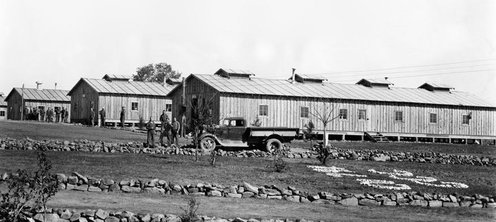
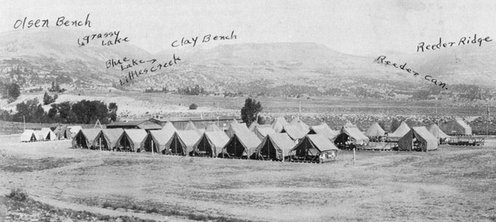
Similar threads
- Replies
- 2
- Views
- 2K
- Replies
- 5
- Views
- 3K



